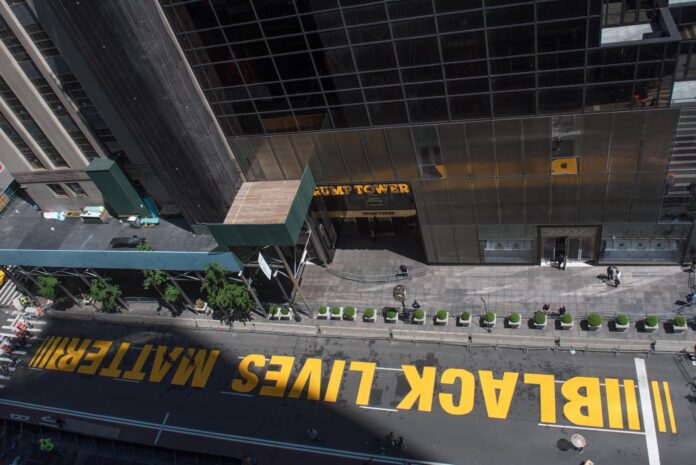A judge has upheld the previous dismissal of a legal action brought by a conservative women’s group against a Black Lives Matter mural, painted in large-scale yellow letters on the street outside New York City’s Trump Tower.
The mural was created in July 2020 on the road surface of Fifth Avenue directly opposite the skyscraper and is thought to have been funded (to the tune of $6,000) by the New York City Department of Transportation, seemingly as part of then-mayor Bill de Blasio’s commitment to commissioning multiple murals dedicated to the Black Lives Matter movement across the city.
In the same month the group Women for America First (WFAF), which supported then-president Donald Trump (who questioned the mural via Twitter when plans for it were first announced), brought a request to the mayor to paint its own mural in the street or a ‘similar’ one. The group’s request to create a mural with its motto—”Engaging, Inspiring and Empowering Women to Make a Difference!”—was not granted and prompted the group to allege a violation of their right to free speech under the First Amendment.
In February 2021, US District Judge Lorna Schofield ruled that city officials did not violate any rights by not allowing the group’s mural and was entitled to apply ‘restrictions’ to street surfaces under its control. It found that the Black Lives Matter mural was a government act of speech rather than a private one, whereas the WFAF’s version would not have fallen within this bracket and therefore could not enjoy same entitlement to create a mural on the site.
In the latest ruling by the Second Circuit, published at the end of May, the judges John Walker, Jr, Joseph F. Bianco and Beth Robinson upheld the ruling and added that, “If a government engag[es] in [its] own expressive conduct, then the Free Speech Clause has no application,” and adding that “in short, the city’s propagation of its own message through the murals did not convert the street surfaces into a public forum”.
Representatives for the defendants did not respond to a request for comment. Ronald D. Coleman, a lawyer from the Dhillon Law Group representing WFAF, said, “Naturally, we were disappointed. We think the court should have squarely addressed what limitations, if any, there are on frankly political, partisan speech by government—and taken a much harder look at the entire ‘government speech’ concept in this era of partisanship.” As to any possible further actions, he said, “We are still considering our options.”
This decision joins a larger body of dialogue over the role and agency of public art prompted by the Black Lives Matter movement, which instigated a wave of murals and memorials within the US and internationally, notably following the murder of George Floyd by police in May 2020.
Other disputes have included the unsuccessful lawsuit brought by police officers in California over a BLM mural they felt was ‘discriminatory’, earlier this year, the American Civil Liberties Union’s unsuccessful lawsuit against the city of Miami Beach over the erasure of a mural in remembrance of a victim of police violence, and ongoing dialogue over the future of public artworks erected to memorialise historic figures linked to colonialism and slavery.

























